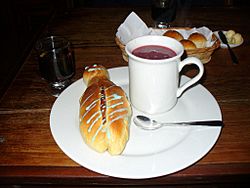T'anta wawa facts for kids

T'anta wawa served with colada morada
|
|
| Type | Sweet roll |
|---|---|
| Region or state | Central Andes |
| Main ingredients | Wheat flour |
T'anta wawa means "bread baby." This name comes from the Aymara and Quechua words t'anta for "bread" and wawa for "child" or "baby." In Spanish, they are often called guagua de pan or muñecas de pan.
These special sweet rolls are shaped and decorated to look like a small child or infant. They are usually made from wheat flour and sometimes have a sweet filling inside. People make and eat T'anta wawas as part of old traditions in the Andes mountains. You can find them in countries like Bolivia, Ecuador, Peru, southern Colombia, and northern Argentina. They are mostly eaten on All Souls' Day, which is November 2nd. They also appear at harvest festivals, carnivals, and Christmas celebrations.
Where T'anta Wawas are Eaten
Ecuador's Traditions
In Ecuador, T'anta wawas are a very important part of the celebration on November 2nd. People often eat them with a special purple drink called colada morada. Families make these bread babies together and then share them with friends and other family members. They are also given to godchildren as gifts.
In some rural areas and native communities, like those in Tungurahua Province, T'anta wawas are used as offerings. They are part of a special ceremony where people connect with their ancestors. It's a way to remember and honor those who have passed away.
See also
 In Spanish: Guaguas de pan para niños
In Spanish: Guaguas de pan para niños
 | Emma Amos |
 | Edward Mitchell Bannister |
 | Larry D. Alexander |
 | Ernie Barnes |

